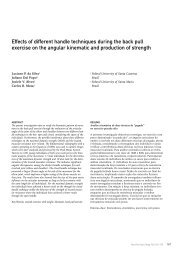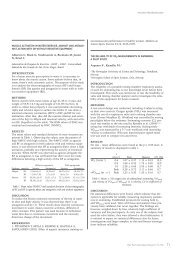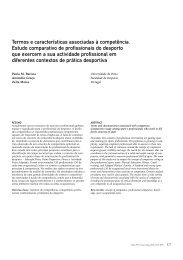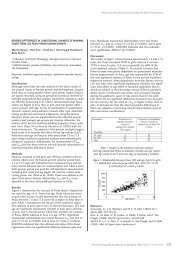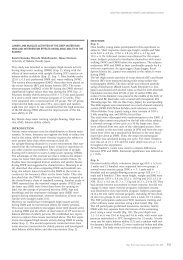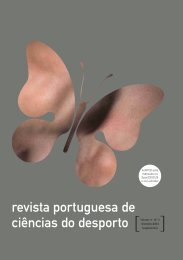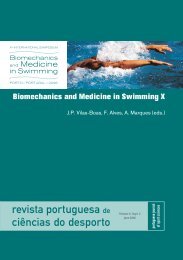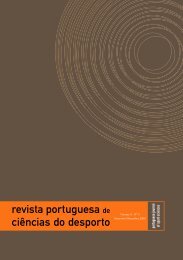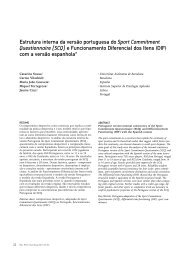35754-Revista FCDEF - Faculdade de Desporto da Universidade do ...
35754-Revista FCDEF - Faculdade de Desporto da Universidade do ...
35754-Revista FCDEF - Faculdade de Desporto da Universidade do ...
Create successful ePaper yourself
Turn your PDF publications into a flip-book with our unique Google optimized e-Paper software.
liza<strong>do</strong>s (ví<strong>de</strong>o, visualização mental) e <strong>do</strong> tempo (horas, sessões).<br />
A prática orienta<strong>da</strong> a<strong>de</strong>qua<strong>da</strong>mente leva ao aumento <strong>da</strong>s<br />
representações em memória, passan<strong>do</strong> o atleta a ter um conhecimento<br />
mais aprofun<strong>da</strong><strong>do</strong> <strong>da</strong>s situações.<br />
Assim, o treina<strong>do</strong>r <strong>de</strong>ver ter em conta esta situação e ir preparan<strong>do</strong><br />
os seus atletas neste senti<strong>do</strong>, orientan<strong>do</strong> a prática para<br />
atingir este objectivo.<br />
5. Sumário<br />
Procuramos, basea<strong>do</strong>s na literatura, reflectir sobre os mecanismos<br />
perceptivos e cognitivos subjacentes à captação <strong>da</strong> informação<br />
pertinente, que possibilita a posterior toma<strong>da</strong> <strong>de</strong> <strong>de</strong>cisão.<br />
Foi evi<strong>de</strong>ncia<strong>do</strong> que os experts no <strong>de</strong>sporto, em geral, se<br />
diferenciam claramente na captação <strong>da</strong> informação, com estratégias<br />
focaliza<strong>da</strong>s no contexto, por oposição aos principiantes<br />
que se focalizam na memória (instruções), o que lhes possibilita<br />
a toma<strong>da</strong> <strong>de</strong> <strong>de</strong>cisões tácticas em consonância com os seus<br />
objectivos, evi<strong>de</strong>ncian<strong>do</strong> maior eficácia.<br />
Está, igualmente, bem <strong>do</strong>cumenta<strong>do</strong> na literatura que a utilização<br />
<strong>de</strong> prática simula<strong>da</strong> po<strong>de</strong> ser muito útil no <strong>de</strong>senvolvimento<br />
<strong>da</strong>s habili<strong>da</strong><strong>de</strong>s perceptivas e cognitivas, nomea<strong>da</strong>mente<br />
quan<strong>do</strong> a simulação é acompanha<strong>da</strong> <strong>de</strong> instruções específicas e<br />
<strong>de</strong> feedback. É, também, claro que a prática para surtir os efeitos<br />
pretendi<strong>do</strong>s não po<strong>de</strong> ficar-se pela quanti<strong>da</strong><strong>de</strong> mas preocuparse,<br />
fun<strong>da</strong>mentalmente, com a quali<strong>da</strong><strong>de</strong> <strong>de</strong>ssa mesma prática.<br />
Referências<br />
1. ABERNETHY, B. (1994). The nature of expertise in sport.<br />
In S. Serpa; J. Alves and V. Pataco (Eds.), International perspectives<br />
on sport and exercise psychology. Morgantown: Fitness<br />
Information Technology, Inc, 57-68.<br />
2. ABERNETHY, B., GILL, D., PARKS, S.L., & PACKER, S.T.<br />
(2001). Expertise and the perception of kinematic probability<br />
information. Perception 30, 233-252.<br />
3. ABERNETHY, B. (2002). Perceptual-motor mestria: What is<br />
learned and how might it be facilited. International Congress<br />
on Movement, Attention & Perception. www.mshs.univ-poitiers.fr/lapmh/map/summarys/<br />
Abernethy<br />
4. ALVES, J. (1985). Relação entre o tempo <strong>de</strong> reacção simples,<br />
<strong>de</strong> escolha e <strong>de</strong> <strong>de</strong>cisão e o tipo <strong>de</strong> <strong>de</strong>sporto pratica<strong>do</strong><br />
(individual e colectivo). Monografia apresenta<strong>da</strong> a provas <strong>de</strong><br />
APCC, ISEF-UTL, Lisboa.<br />
5. ALVES, J.; ARAÚJO, D. (1996). Processamento <strong>da</strong><br />
Informação e toma<strong>da</strong> <strong>de</strong> <strong>de</strong>cisão no <strong>de</strong>sporto. In J. Cruz<br />
(Ed) Manual <strong>de</strong> psicologia aplica<strong>da</strong> ao <strong>de</strong>sporto e à activi<strong>da</strong><strong>de</strong><br />
física. Braga: Sistemas Humanos, 361-388.<br />
6. ALVES, J., BRITO, A.P. ; PROTEAU, L. (1994). Intelligence<br />
et rapidité du traitement <strong>de</strong> l’information. Bulletin <strong>de</strong><br />
Psychologie vol. 68, nº 418, 140-159.<br />
7. ALVES, J. & MARTINS, F. (2003). Information processing<br />
and intelligence: Inter-stimulus interval and uncertainty in<br />
the response. Int. J. of Sport Psychology 34 (4), 329-339.<br />
8. ARAÚJO, D.; SERPA, S. (1999). Toma<strong>da</strong> <strong>de</strong> <strong>de</strong>cisão <strong>de</strong> veleja<strong>do</strong>res<br />
<strong>de</strong> alta competição. In J. Alves, M. C. Serra e N.<br />
Casanova (Eds) Aprendizagem Motora e Toma<strong>da</strong> <strong>de</strong> Decisão no<br />
<strong>Desporto</strong>. Guar<strong>da</strong>: IPG, 115-150.<br />
9. ARAÚJO, D.; SERPA, S. (2000). The <strong>de</strong>velopment of expertise<br />
in sailing. Congrès International <strong>de</strong> la SFPS, Paris<br />
INSEP.<br />
10.BAKER, J., HORTON, S., ROBERTSON-WILSON, J. &<br />
WALL, M. (2003). Nurturing sport expertise: Factors<br />
influencing the <strong>de</strong>velopment of elite athlete. Journal of Sports<br />
GRUPOS DE INTERESSE<br />
Science and Medicine 2, 1-9.<br />
11.BARD, C. ; FLEURY, M. (1976). Perception Visuelle et<br />
Sports Collectifs. Mouvement<br />
2(1).<br />
12.BARD, C., GUEZENNEC, Y. & PAPIN, J.-P. (1981).<br />
Escrime: Analyse <strong>de</strong> l’Exploration Visuel. Médicine du Sport<br />
T. 55 : 4, 22-29.<br />
13.BERRY, J. & FARROW, D. (1999). Pattern recognition and<br />
expertise in teams sports: Australian football. 5 th IOC World<br />
Congress on Sport Sciences, Sydney.<br />
14.COTÉ, J., BAKER, J. & ABERNETHY, B. (2003). From play<br />
to pratice: A <strong>de</strong>velopmental framework for the acquisition<br />
of expertise in team sports. In J. L. Starkes & K. A. Ericsson<br />
(Eds.) Expert performance in sport: advances in research on sport<br />
expertise. Champaign, IL: Human Kinetics, 89-114.<br />
15.DURAND-BUSH & SALMELA, J. (2002). The <strong>de</strong>velopment<br />
and maintenance of expert athletic performance: perceptions<br />
of world and olympic champions. Journal of Applied<br />
Sport psychology 14, 154-171.<br />
16.ERICSSON, K.A. (2003). Development of elite performance<br />
and <strong>de</strong>liberate practice: An up<strong>da</strong>te from the perspective of<br />
the expert performance approach. In J. L. Starkes & K. A.<br />
Ericsson (Eds.) Expert performance in sport: advances in research<br />
on sport expertise. Champaign, IL: Human Kinetics, 49-84.<br />
17.FRENCH, K. E. & MCPHERSON, S. L. (2004).<br />
Development of expertise in sport. In M R. Weiss (Ed.)<br />
<strong>de</strong>velopmental sport and exercise psychology: a lifespan perspective.<br />
Morgantown, Fitness Information Technology, Inc, 403-424.<br />
18.GARDNER, J.J. & SHERMAN, A. (1995). Vision requirements<br />
in sport. In D.F.C. Loran &C.J. MacEwen (Eds) Sports<br />
Vision. Oxford, Butterworth-Heinmann, 22-36.<br />
19.HAGEMANN, N. & STANTZE, U. (2003). Expertise in<br />
unconscious control? In R. Stelter (Ed.) New approaches to<br />
exercise and sport psychology: theories, methods and applications.<br />
XI European Congress of Sport Psychology (FEPSAC),<br />
Copenhagen, 69.<br />
20.JANELLE, C. M. & HILLMAN, C. H. (2003). Expert performance<br />
in sport. Current perspectives and critical issue. In J.<br />
L. Starkes & K. A. Ericsson (Eds.) Expert performance in sport:<br />
advances in research on sport expertise. Champaign, IL: Human<br />
Kinetics, 19-48.<br />
21.LORAN, D.F.C. & GRIFFITHS, G.W. (1998). Visual performance<br />
and soccer skills un<strong>de</strong>r 14 players. Sport Vision<br />
Newsletter 10, 128.<br />
22.MORAN, A.P. (1996). The psychology of concentration in sport<br />
performers. Hove: Psychology Press.<br />
23.POPLU, G. & BARATGIN, J. (2003). Theoretical and<br />
applied aspects of 3d simulation in sport: realistic visual<br />
scenes versus 3d abstract representations. In R. Stelter<br />
(Ed.) New Approaches to Exercise and Sport Psychology: Theories,<br />
Metho<strong>de</strong>s and applications, XI European Congress of Sport<br />
Psychology (FEPSAC), Copenhagen, 132.<br />
24.PORTE, B. (1994). Analyse <strong>de</strong> la tâche psychologique:<br />
recherche <strong>de</strong> profils <strong>de</strong> capacités chez <strong>de</strong>s régatiers <strong>de</strong> haut<br />
niveau. In M. Audiffren & G. Minvielle: Actes du congrès international<br />
<strong>de</strong> la société française <strong>de</strong> psychologie du sport. Poitiers:<br />
UFR APS.<br />
25.PROTEAU, L. & GIROUARD, Y. (1987). La prise <strong>de</strong> décision<br />
rapi<strong>de</strong> en situation <strong>de</strong> choix dichotomique: une approche<br />
intégrée qui tient compte <strong>de</strong> l’amorce et <strong>de</strong> l’exécution<br />
<strong>de</strong> la réponse. Review Canadienne <strong>de</strong> Psychologie 41(4) :<br />
442-473.<br />
<strong>Revista</strong> Portuguesa <strong>de</strong> Ciências <strong>do</strong> <strong>Desporto</strong>, 2004, vol. 4, nº 2 (suplemento) [15–102] 41



